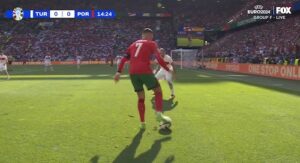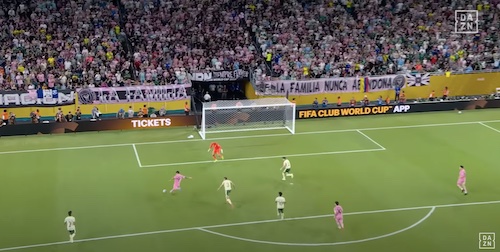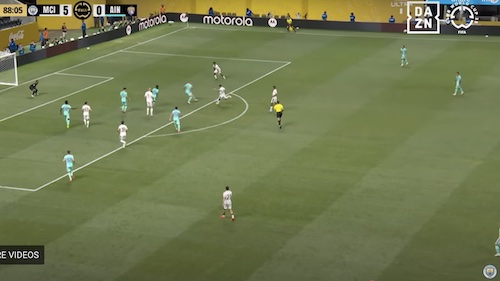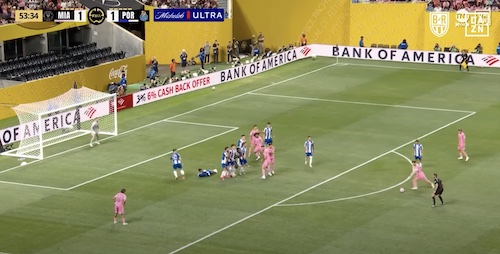|
The decade of the Galactico and the underdog, of Becks in America and billionaire owners in England, of the Moggiopoli scandal and ZiZi’s headbutt. The Galactico When Florentino Pérez, armed with the deal to bring Luis Figo to the Bernabeu, won the Real Madrid presidency in July 2000, he ushered in the era of previously unimaginable transfer fees and a superstar culture within soccer. The Portuguese cost a world-record €58million, a mark that was beaten the following summer when Zinedine Zidane arrived from Juventus for €78million. Brazilian striker Ronaldo and David Beckham were added to the Galacticos, who had won two La Liga titles by 2003. Zidane volleyed a sumptuous winner to claim the 2002 Champions League, but a failure to invest in defensive players, much-publicised unprofessional training methods and unhealthy levels of expectation which meant that current incumbent Manuel Pellegrini is their ninth manager in seven seasons, have resulted in a failure to make it to the last eight of European competition since 2004. After three years away, Perez returned for a second stunning spending spree in 2009, with Brazilian playmaker Kaka moving from AC Milan and the €94million spent on Cristiano Ronaldo another global benchmark. It remains to be seen whether his great experiment will come off second time around. Much to Real’s chagrin, fierce rivals Barcelona have stolen the show in recent years. Inspired by the magical Ronaldinho, the Catalans claimed the Champions League in 2006, and, in former midfield general Pep Guardiola’s first season as Coach, they repeated the feat this year. In fact, in 2009, Barça won every competition they entered, and did so with considerable panache. An increasing emphasis on discipline has never stifled creative instincts and, with Xavi and Andrés Iniesta pulling the strings from deep, and a certain Lionel Messi amongst those providing the finishing touches, the Barcelona of 2009 must go down as the team of the decade. Billionaire Owners in England Nowhere has money appeared more prominently in soccer than England, with overseas investment taking the top clubs to new financial planes. Russian oligarch Roman Abramovich bought Chelsea in 2003, and has spent over £700million on the club – mostly in transfer fees and contracts – to date. Back-to-back Premier League titles arrived for the charismatic Jose Mourinho, but European glory continues to elude them. Manchester City are the newest of the nouveau riche, Sheikh Mansour’s Abu Dhabi United Group having bought the club in the summer of 2008 and since pumped £242million into the transfer market. City ruffled some feathers in the immediate purchase of Robinho and high-profile pursuit of Kaka, and will set the highest of demands for new manager Roberto Mancini. Leeds United experienced the flip side of the fashion for financial irresponsibility. European semi-finalists in 2001, failure to qualify for the following season’s competition meant that the club were unable to keep up repayments on enormous loans taken out by Chairman Peter Ridsdale. Forced to sell the majority of the squad, Leeds were relegated from the Premier League in 2004 and, after going into administration in 2007, dropped to the third tier of English football for the first time in their history. Arsenal’s ‘Invincibles’ went the whole league season unbeaten in 2003-04, whilst Liverpool grabbed Champions League glory in 2005. The final in Istanbul, a 3-3 draw with AC Milan that was eventually decided in Liverpool’s favour by a penalty shoot-out, was the match of the decade. Kaka was rampant in the first 45 as the Italians stormed into a 3-0 lead, but an incredible Liverpool comeback – with three goals in six minutes early in the second half – sent the game into extra time. Jerzy Dudek saved impossibly from Andriy Shevchenko, before Shevchenko missed his spot kick to hand Liverpool victory. The ‘Moggiopoli’ Match-Fixing Scandal Milan’s heartbreak may just epitomise a torrid decade for Italian soccer. Italian clubs dominated European competition in the ‘90s, but were far less successful in the ‘00s. The real problems were at home though. In May 2006, police uncovered telephone conversations between Luciano Moggi and prominent soccer officials, the Juventus general manager influencing refereeing appointments for Serie A games. The ‘Moggiopoli’ match-fixing scandal saw Juventus stripped of their league title, and demoted to Serie B with a nine point deduction to begin the following season, while four other clubs started the following season with negative points. Three incidents in 2007 rocked Italian soccer to its foundations. An official was killed when trying to stop fighting at amateur game in Luzzi in January, and, after the death of policeman Filippo Raciti at the Sicilean derby six days later, play was suspended nationwide for a week. The death of a Lazio fan, killed by a stray police bullet at a petrol station in November, was a further setback. Unfortunately, African soccer has also endured a number of stadium tragedies in the noughties. 127 fans died in a stampede in Accra, Ghana in May 2001, after police used tear gas to stop supporters throwing seats on the pitch. Eight years on and, despite a growing global appreciation for the African game thanks to high-quality exports playing in Europe and with the World Cup preparing to come to Africa for the first time in 2010, it seems as though lessons had not been learned. At a match between Ivory Coast and Malawi in Abidjan in March 2009, police again responded with tear gas after ticketless fans tried to rush the gates. A stampede saw 22 dead and hundreds injured. Becks in America After his appointment as MLS Commissioner in August 1999, Don Garber has successfully directed the progress of American soccer in the past decade. The MLS has seen significant expansion, from ten franchises in 2001 to sixteen in 2010. Audience figures – both in stadiums and for televised games – are on the up, and there are now seven soccer-specific stadiums. David Beckham’s move from Real Madrid to LA Galaxy in 2007, in a deal worth $250million over five years, showed American soccer’s ambition. Becks was charged not just with succeeding on the field, but in spreading soccer’s appeal stateside. 2009 saw the Englishman getting stick from both his own fans and his team-mate Landon Donovan, but he bounced back to help earn Galaxy in MLS Cup final appearance. The Underdog The noughties were the decade of the underdog. Calais became the first amateur side to reach the French Cup final in the competition’s 82-year history in 2000, whilst newly-promoted Hoffenheim topped the Bundesliga at the halfway mark in 2008-09, before eventually slipping to seventh, itself a remarkable achievement for a club in the fifth tier of German soccer as the decade began. Senegal’s famous victory over world champions France in the opening game of the 2002 World Cup was a sign of things to come, as co-hosts South Korea beat Italy and Spain before eventually falling to Germany in the semis. In 2004, unfancied Porto went all the way in the Champions League, defeating Monaco 3-0 in the final, before Greece, 150-1 outsiders as the tournament began, claimed the European Championship with a series of gritty 1-0 wins in the knockout stages. Ronaldo scored two as Brazil took home their fifth World Cup crown in 2002, while Spain finally fulfilled their promise in winning Euro 2008. Germany were beaten finalists on both occasions. Italy won the 2006 World Cup, defeating 10-man France on penalties after a 1-1 draw in Berlin. The Head Butt World Soccer magazine recently awarded Ronaldinho with their player of the decade accolade, but, for me, Zinedine Zidane defined the noughties. The Frenchman started the decade by claiming EUFA Player of the Tournament as France won Euro 2000, before the chief Galactico scored a stunning winner as Real reached their zenith in 2002. Made captain after returning from international retirement, Zidane dragged the French through to the final of the 2006 World Cup. His seventh-minute penalty in the showpiece was audaciously chipped down the middle, clipping the crossbar and crossing the line by the finest of margins. With ten minutes remaining in extra time, Zidane turned and planted his head into the chest of Marco Materazzi, knocking the Italian defender to the ground. His dismissal again raised the question of technology in sport, as the fourth official informed the referee – who had missed the incident – after allegedly seeing it in replayed on television. The image of Zidane walking off, head bowed, past the Jules Rimet trophy, is an enduring one. Much to FIFA’s embarrassment, votes cast at half-time made the Frenchman the winner of the Golden Ball for the World Cup’s best player. The conflicted playmaker, a genius and yet a villain sent off 14 times in his career, was playing in his last game before retirement. What a way to go out. Tom Sheldrick is a freelance writer and can be reached at: tomsheldrick@hotmail.com |
The Noughties in Soccer















